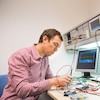
The Circle project will create a competence center for smart environmental impact assessment to Central Ostrobothnia, which will comprehensively unite the parties operating around the environmental ecosystem; industry, mining and SMEs, consultants, and environmental authorities to develop new digital, smart and cost-effective solutions for monitoring and assessing the impact of the companies operating environment in cooperation with research organizations. By developing the monitoring of the operating environment and environmental impact through digitalization and artificial intelligence, it is possible to meet the environmental challenges of the companies and thereby improve the operating conditions of companies and thus also support the province's coping from COVID-19 impacts.
The competence center combines different competence areas (digitalization, environmental technology, environmental competence, measurement technologies) in a new way from the point of view of monitoring the effects of the operating environment that is important to the operations of companies. This will create a new kind of knowledge and know-how that can be used to meet environmental obligations more cost-effectively and in a more versatile way. As a result, companies can better carry out their activities so that the activities and their effects meet the requirements of environmental authorities.
The implemented solutions respond to the challenges and needs of the project's target group in monitoring the environment. Solutions that utilize digitalization and artificial intelligence will encourage and help the industrial, mining and SME companies that are the target group of the project, as well as the environmental authorities to reform their practices. The project will increase the competitiveness of companies by increasing the use of new, more costeffective and energy-efficient digital solutions that produce richer information, while supporting the business actions of companies, for example by providing information on the state of the environment to support investment decisions.
The project also has significant results from a green transition perspective. The project's solutions reduce the energy consumption and CO2 emissions of the monitoring of the operating environment, both in terms of the technologies used and the practices and services built on them. Compared to current manual measuring devices, the new metering solutions are tens, even hundreds of times less energy consuming, and the practices built on these technologies, for example, require significantly fewer field trips and reduce the resulting amount of traffic. The project will also increase the share of renewable energy sources in the energy production of equipment for measuring environmental ecosystems.
The project will create capabilities for the commercial exploitation of new solutions. The new solutions to be developed enable, for example, R&D to develop and commercialize new products, processes, and services. In both the short and long term, the comprehensive application of artificial intelligence and IoT in the context of environmental business also supports the development of new environmental measurement services. The pilots in the project will be implemented under an open licensing policy. In this way, the producibility of the results can be achieved as easily and quickly as possible, if the needs are seen. In particular, opportunities are opened up for new types of measurement services that can be replicated all over Finland and even the whole world. The preconditions for commercialization are investigated in co-operation with the competence center participants through pilots. Through the pilots, a new business models for the field of environmental expertise based on the collected and processed data (e.g. utilizing artificial intelligence) can be found.
The measurement solutions developed in collaboration with the competence center of the project and the practices built on them can be generalized considerably beyond the pilot areas of the project. When assessing the effectiveness of the project's results, it is worth considering the extent of the effects, as the project's activities reform the entire field of environmental measurement and practices. The solutions developed in the project, will make current operating methods and services more information-rich, real-time, cost-effective and less energy-consuming.
The project implements the guidelines of the regional corona-exit report, as well as the key strategies of the Central Ostrobothnia region (including the provincial strategy and the smart specialization strategy). In addition, the city of Kokkola's ecosystem agreement has been considered in the project preparation. The project also contributes to the operation of several major digital innovation centers, where the project promoter is involved in.
Information technology, research and projects
Head of Information Technology Unit

Information technology, research and projects

Information technology, research and projects



